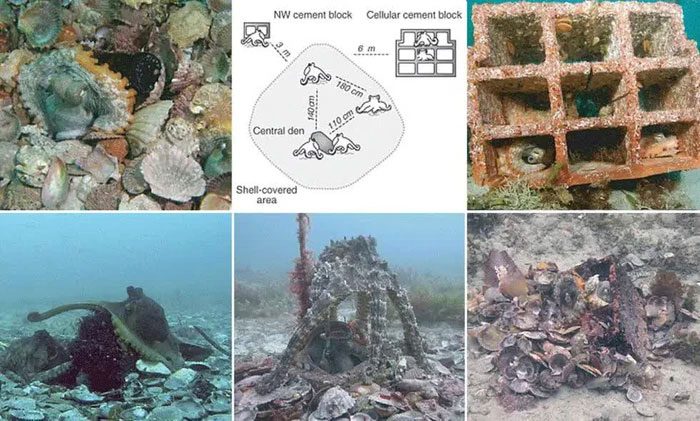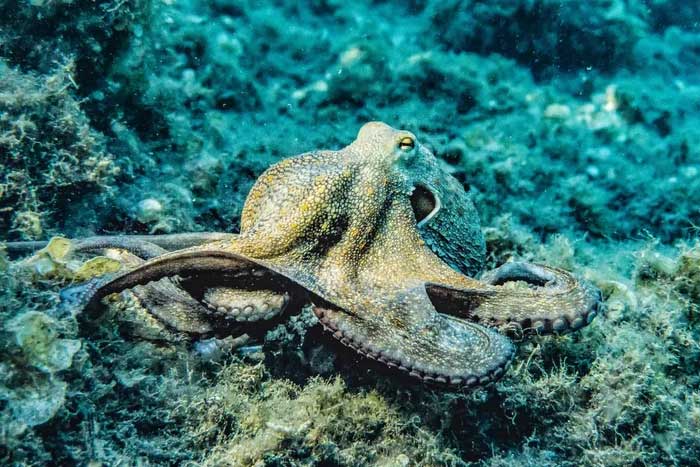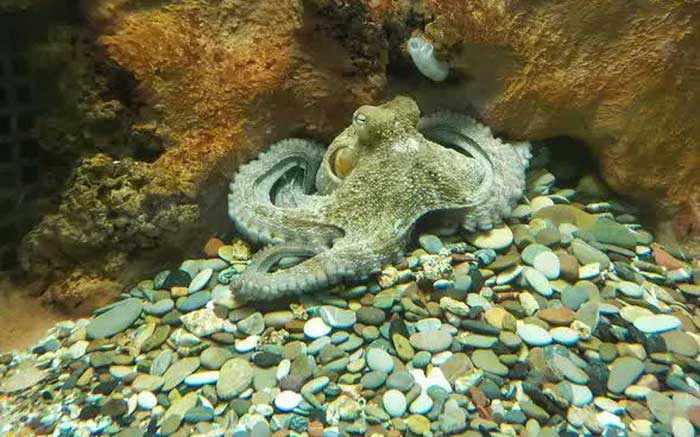Below the depths of the ocean lies a captivating world of marine life thriving in its own right. While many are familiar with coral reefs and the diverse ecosystems they support, recent discoveries have unveiled another intriguing wonder: Oclantis, a submerged city believed to be constructed by octopuses.
Oclantis: The Octopus City
The existence of Oclantis was first revealed through observations by marine biologists and underwater explorers. Their encounters with octopuses led to the discovery of complex and highly organized structures on the ocean floor, sparking curiosity and speculation about the possibility of an octopus-built city.
Oclantis is a complex array of structures created by octopuses using shells, stones, and other materials found on the seabed. These structures, resembling caverns and gardens, feature interconnected rooms, intricate pathways, and even protective stations. The complexity and purposeful design of these formations demonstrate the intelligence and social cooperation among octopuses.

In Australia, octopuses have been observed gathering, communicating, and even engaging in playful interactions at a site marine biologists refer to as Octlantis, located in Jervis Bay, south of Sydney. Professor David Scheel, the lead researcher, stated: “These behaviors are products of natural selection and may be very similar to the complex social behaviors of vertebrates.”
The construction of Oclantis is believed to be influenced by the unique environmental conditions where octopuses thrive. This city provides shelter, protection, and access to food, creating a symbiotic relationship between the octopuses and their constructed habitat. This adaptation highlights the remarkable capabilities of these highly intelligent cephalopods.
Another site in Jervis Bay, discovered at a depth of 15 meters below the surface in 2009 and named Octopolis, is thought to be an anomaly formed around a large man-made metallic object. Researchers found numerous remains of prey scattered around, which were even utilized to construct dens.
Peter Godfrey-Smith, author of Other Minds: The Octopus and the Evolution of Intelligent Life, who dived at this site, referred to it as a type of “artificial reef,” a safe underwater island in a dangerous area, serving as a barrier against predators like sharks, seals, and dolphins.
The Complexity of Octopus Social Structures
For a long time, octopuses have been regarded as solitary creatures, but the discovery of Oclantis has challenged this perception. Observations indicate that octopuses in the Oclantis city exhibit cooperative behaviors, share resources, and engage in community activities. This suggests the existence of a social structure that is far more complex than previously understood in octopus society.
Octopuses possess sophisticated communication skills, utilizing visual displays, body language, and color-changing abilities to convey messages and establish social hierarchies. The cooperation demonstrated in the construction of Oclantis reflects a higher level of social organization among these remarkable creatures, surpassing earlier assumptions about their solitary nature.

Typically, octopuses only meet to mate, then separate. However, scientists need to conduct further research to understand why they choose to live together in cities like Oclantis.
Oclantis provides insights into knowledge transmission among octopuses. Younger individuals have been observed learning from more experienced members of the community, acquiring essential skills to build and maintain the city. This knowledge transfer emphasizes the importance of learning and social motivation within octopus society.
Implications and Future Research
The discovery of Oclantis holds significant implications for our understanding of marine ecosystems. The presence of this city may contribute to the overall biodiversity and ecological balance of the area, providing habitats for various species and promoting marine life development.
Oclantis offers a glimpse into the astonishing intelligence and adaptability of cephalopods. Understanding the complexity of octopus society, their cooperative behaviors, and architectural skills can enhance our knowledge of evolutionary pathways and the cognitive abilities of these fascinating creatures.

The city of Oclantis showcases the superior intelligence and social behavior of octopuses.
At the same time, the discovery of Oclantis underscores the importance of marine environmental protection and the fragile balance of underwater ecosystems. Preserving these habitats is crucial for the survival of species like octopuses and for continuing to explore their remarkable behaviors and potential future discoveries.
Oclantis, the underwater city believed to be constructed by octopuses, exemplifies the superior intelligence and social behavior of these mysterious creatures. The discovery of this complex and constructed habitat challenges our understanding of octopus intelligence, social structures, and their role in shaping marine ecosystems.


















































